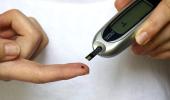Exposure to higher air pollution levels for several hours a day can increase insulin resistance in the body and further affect those with diabetes, warns diabetologist Dr Manoj Chawla.

While India and the rest of the world is battling a pandemic, we cannot ignore the other challenges staring at us.
Air pollution, one of the biggest health challenges faced by the modern world, is a major cause of global warming and is instrumental in the proliferation of diseases.
This health hazard also appears to have a role in the development of diabetes.
Most Indian cities are among some of the most polluted in the world.
1. Type 1 diabetes
A major impact of air pollution is felt in the form of the type 1 diabetes.
Various studies conducted over a period of time have revealed that children with Type 1 diabetes had been highly exposed to ozone and sulfate pollution.
Oxidative stress can increase the presence of free radicals which in turn affect organs sensitive to oxidative stress and also damage the beta cells in the body.
2. Insulin resistance
Air pollutants reduce the production of insulin when they enter the blood stream and trigger inflammation.
In the cells, tissues and other organs, this inflammatory mechanism can disrupt the regulation of hormones.
PM 2.5 is the most dangerous air pollutant for people with diabetes and is associated with a rise in triglyceride levels and blood glucose.
People living closer to major highways and busy roads are more likely to have higher fasting glucose levels than others.
3. Obesity and diabetes
Despite the notion that children are more active than the adults as far as physical activity is concerned, there is a growing prevalence of childhood obesity.
Separately, studies have already confirmed that obesity is conducive to the development of diabetes in people.
Air pollution can have an adverse impact on metabolism and abet many diseases, including diabetes and obesity.
Exposure to higher air pollution levels for several hours a day can increase insulin resistance in the body and further affect those with diabetes.
4. Autoimmunity
One of the major adverse effects of air pollution is that it is a conducive factor for various autoimmune diseases, such as type 1 diabetes.
After the World Trade Center disaster in 2001, it was discovered that the personnel involved with the recovery operations were at a greater risk of autoimmune diseases.
Diesel exhaust particles (DEP) affect the T cells which have a direct link with problems such as autoimmunity and type 1 diabetes.
5. Gestational diabetes
Systematic review and meta-analysis of various studies revealed that exposure to different air pollutants can lead to gestational diabetes.
During the first trimester of the pregnancy, greater exposure to SO2 led to increased gestational diabetes risk.
Further, air pollutants can even lead to various pregnancy complications, including gestational diabetes, raised blood pressure, preeclampsia etc., in the early stages of pregnancy.
Traffic-related pollutants can lead to reduction in glucose tolerance during the pregnancy.
Exposure to nitrogen oxides before and during the early weeks of pregnancy also pose a greater risk of gestational diabetes.
Considering how the problem of air pollution is severe in most urban areas across India, it is extremely important that people take appropriate precautions, such as wearing anti-pollution face masks, using air purifiers wherever feasible and avoiding prolonged exposure to fumes.
At the governmental level, it is urgently needed that particulate emissions in the air are brought down to safe levels for the overall prevention of diabetes as well as various other life-threatening diseases that affect millions of Indians every year.
Dr Manoj Chawla is director and consultant diabetologist at Lina Diabetes Care, Mumbai and Mumbai Diabetes Research Centre.











